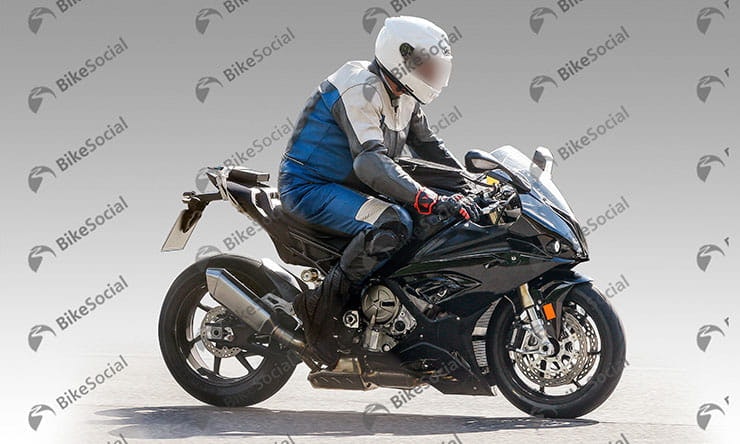*Full review of the 2019 BMW S1000RR available here*
It was almost exactly a decade ago, back in 2007, that a team of BMW personnel were spotted testing a bunch of Japanese 1000cc superbikes on a track in Spain. As well as Honda Fireblade, a Suzuki GSX-R1000 and a Kawasaki ZX-10R there was a black Yamaha R6 at the test. Except there was nothing from Yamaha under the R6 bodywork; the mechanical parts were prototype bits would become the BMW S1000RR. Here was a superbike that could squeeze itself into the bodywork of the smallest 600cc sports bike then on the market.
BMW eventually fessed up to the project in early 2008, releasing pictures of a race-prepped prototype S1000RR – and announcing its name – in April that year, along with sketches of the road-going version that would be on sale in 2009.
Sit one of those first-generation, 2009 S1000RRs next to the latest, 2017 model and you’ll see plenty of changes, but the overwhelming impression is how little BMW has had to alter to keep it competitive over nearly a decade of production.
Now, though, the time has come for BMW to completely revamp its standard-bearer.
This spy shot is among several showing the next-generation S1000RR under test, and just as that original prototype in 2007 amazed onlookers by comfortably fitting into bodywork designed for a machine with only 60% of its capacity, the initial impression is that it’s absolutely tiny.
BMW has made its original S1000RR engine last the best part of a decade in front-line use, and no doubt will keep it in action in machines like the S1000R and S1000XR for a few years’ to come, but it’s created a new motor for the next-gen version. None of the visible castings are shared with the existing bike, and some key components have moved. The water pump appears to have been repositioned from the right hand side to the left, and the oil sight glass has gone the other way, swapping from left to right. What can be seen of the cases, cylinders and head are all different to those of the existing bike, too.
Of course it’s still a four-cylinder, and shares some design cues with the existing bike. Notable is the exhaust collector, with two odd-sized pipes taking exhaust into the end-can – a solution shared with the current model. That collector is reshaped, though, to make space for a notable new feature of the bike – its under-braced swingarm. Putting the bracing below rather than above the swingarm is the current trend in racing, with both MotoGP and WSBK bikes tending to follow the practice. Road bikes rarely use the design, though, as it tends to interfere with the exhaust system’s main collector box. By reshaping the collector, BMW has been able to accommodate the race-style swingarm, presumably bringing weight and handling benefits.
The frame itself is also new, and no doubt lighter than the current design. In particular, the trellis-style seat subframe appears more sophisticated than the current bike’s version, which is made of square-section tubing. Although black, it appears that the frame is still aluminium; BMW’s expertise with carbon fibre means that a carbon-chassis version, like the new HP4 Race, is almost certain to be offered as well, though.
On this prototype, the forks look much like the current S1000RR units, as does the rear shock and the brake calipers. The front brake discs appear to be race-style units, lacking the ABS sensors that are sure to be fitted to the final version.
In terms of styling, the bodywork notably steps away from the lopsided look of the current model. Both headlights match, as do the side panels, which have no sign of the right-hand-side shark gills that have become a signature of the S1000RR over the last eight years. The circular headlights may well be there simply to do the job on the prototype while more heavily styled lenses are prepared, as there’s clearly scope for the headlight cut-outs to accommodate slanted lights. In fact, the shape of the headlight openings closely matches the latest BMW car headlight designs, suggesting that BMW might be forging tighter ties between its styling in two- and four-wheeled departments. The intake between the headlights is pure S1000RR, though. Indicator lenses move to the mirrors, cleaning up the sides of the bike.
The rear end again has hints of the current bike, and seems set to share the saw-tooth-shaped tail edge. As usual the indicators and reflector are mounted on the easily-removed licence plate hanger.
Given the state of the bike seen here, it’s likely that BMW will reveal the finished version at the end of this year and put it into production in 2018. Will it also herald a return to top-level production bike racing for the firm, which dropped its works WSB effort at the end of 2013?
Don’t bet against it.
Photo: BMH Images
Share on social media:
